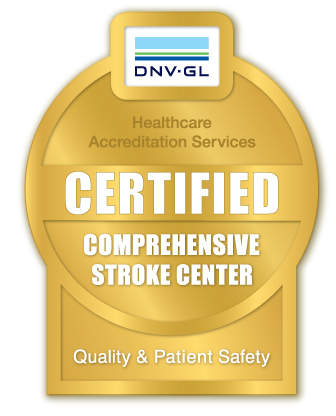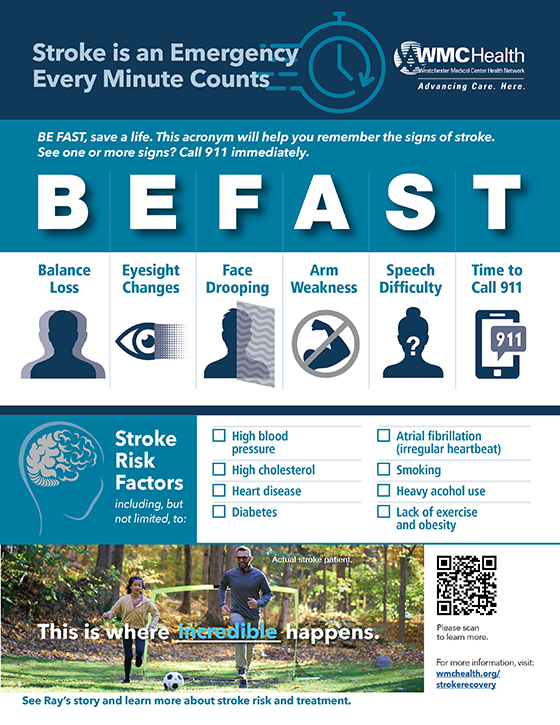A Comprehensive Stroke Center
Welcome to Westchester Medical Center (WMC), the flagship of Westchester Medical Center Health Network, and the only hospital in the Hudson Valley recognized as a Comprehensive Stroke Center. As a certified Comprehensive Stroke Center, we can receive patients from throughout the Hudson Valley and beyond via Life Flight air transport and support from our transfer center team. Our dedicated, 24/7 stroke team is always on call to provide life-saving neurological and neurosurgical care for patients experiencing acute stroke.
As the region’s leading stroke care providers, we are honored recipients of the American Heart Association/American Stroke Association's Get with the Guidelines® Stroke Gold Plus Quality Achievement Award.
Our stroke care extends throughout the region through community hospitals that are designated primary stroke centers: Good Samaritan Hospital, MidHudson Regional Hospital and HealthAlliance Hospital.

What Is a Stroke?
Stroke is a medical emergency that can result in permanent neurological damage; complications such as pneumonia, brain swelling, seizures and blood clots; or death. It is a leading cause of long-term adult disability in the United States and the second leading cause of death globally. Risk factors for stroke include advanced age, hypertension, previous stroke or transient ischemic attack (TIA), diabetes, high cholesterol, cigarette smoking, and atrial fibrillation. High blood pressure is understood as the most important modifiable risk factor for stroke.
There are two main types of stroke: ischemic and hemorrhagic. Ischemic stroke is caused by a lack of blood flow to the brain, often due to blockages or arterial embolism. Hemorrhagic stroke is caused by bleeding in the brain. Both types of stroke can result in the loss of brain function, which may cause inability to move limbs on one side of the body, difficulty speaking or understanding speech, or loss of vision in one side of the visual field.

Rapid Assessment. Rapid Action.
From the moment EMS notifies our hospital of an incoming stroke patient, our stroke response activates. A 24/7 team of triage nurses, radiologists, neurologists, neurosurgeons and pharmacists prepare for the patient's arrival. Once a patient enters our doors, our multidisciplinary team begins performing a rapid assessment and evaluation of the patient's condition, administering appropriate treatments, and coordinating with other medical professionals as needed to provide the best possible care for the patient. The full team may include:
- EMTs
- Triage Nurses
- Radiologists (and CT scan)
- Pharmacists
- Neurologists
- Neurosurgeons
- Residents, Stroke Attending, Emergency Department physicians, nurses and more
Clinical Research
Our neurologists are prolific researchers whose work is frequently published in academic medical journals. Our physicians and patients are involved in numerous clinical studies. Learn more about Stroke Clinical Research at Westchester Medical Center.
News
Decoding the Silent Stroke Risks Hiding in Your Medical History
The Dawning of a New Age in Stroke Care?
Stroke Treatment Options
Ischemic Stroke Treatment
Treatment for ischemic stroke may include intravenous thrombolysis (thrombolytic therapy). Alteplase or tenecteplase are drugs used to break up the clot. These drugs are commonly known as a "clot buster." In some patients, additional treatment is needed to remove the clot.
Westchester Medical Center and MidHudson Regional Hospital are unique as two of the few hospitals in the area with the trained surgeons and facilities needed for endovascular thrombectomy, another stroke treatment option in which a skilled neurosurgeon physically removes the clot. In a thrombectomy, the neurosurgeon inserts a catheter via a small incision, typically in the groin. Using real-time imaging technology, the neurosurgeon carefully guides the catheter through a network of blood vessels, arriving at the clot. Tiny surgical tools are then used to remove the clot. A small device may be permanently placed in the blood vessel to help it stay open and healthy. Surgeons may also perform carotid stenting and carotid endarterectomies in the treatment of ischemic stroke.
Hemorrhagic Stroke Treatment
Treatment for hemorrhagic stroke is also available at Westchester Medical Center. One type of hemorrhagic stroke is caused by a ruptured aneurysm. This is typically treated with an endovascular approach. One common approach is endovascular coiling, in which the surgeon introduces a coil made of metals like platinum to promote clotting and stabilization of the aneurysm.
In some cases, the surgeon may clip the aneurysm in an open craniotomy. Clipping an aneurysm refers to placing a permanent titanium clip on a section of the artery in order to prevent blood from entering the aneurysm, worsening the patient’s condition, and increasing risk of rupture.
Telestroke Program
Our Telestroke Program allows us to extend Westchester Medical Center’s expertise to community-based hospitals throughout the Hudson Valley. Physicians at neighboring facilities seeking telestroke support facilities can instantly alert WMC neurologists of a new stroke patient. Using technology that is quite similar to making a video call on your phone, our neurologist can conduct a comprehensive stroke exam in real-time with the patient. This evaluation may help the patient receive local care or may indicate a need for the patient to be immediately transported to Westchester Medical Center for more complex acute care.
Revolutionary Diagnostic Technology for Heart Complications
WMC is the only facility in the region to have robotic TCD (transcranial doppler) imaging technology. This advanced imaging technology allows neurologists to perform a diagnostic test that may reveal if a patient has patent foramen ovale (PFO), a very common congenital heart condition characterized by a hole in the heart. PFO may be the cause of stroke in some patients. If PFO is discovered after the initial stroke has been treated, then the neurologist may recommend closure of this hole to reduce potential risk of future stroke. Many of these closures are performed at Westchester Medical Center.
Stroke Recovery and Follow-Up Care
Stroke rehabilitation can help restore lost function. Rehab typically involves speech and language therapy, physical therapy, and occupational therapy.
To prevent recurrence of a stroke, patients may be given antiplatelet drugs such as aspirin and dipyridamole, and may be treated for hypertension and high cholesterol. In some cases, carotid endarterectomy and anticoagulant medication may also be beneficial.
The Stroke Rehabilitation Program at Westchester Medical Center uses advanced technologies to promote recovery, including virtual reality and exoskeleton suits that provide support to survivors as they relearn balance and walking skills.
Stroke Care Resources
Learn about our Clinical Research Program
Brain and Spine Institute
Find a neurologist near you
Stroke Support Group
Our all-virtual stroke support group provides a monthly opportunity for stroke survivors to connect with one another and share resources, while also receiving useful nutrition and physical therapy information from expert healthcare providers.
Community Education and Outreach
We offer community outreach and education for a variety of audiences, from fellow clinical providers and emergency medical service (EMS) technicians to the general public. To request stroke education for your community or event, please contact Stroke.Support.Group@WMCHealth.org.
Patient Stories
Watch Ray’s stroke story. EMTs bypassed other hospitals and rushed Ray directly to Westchester Medical Center, where he received life-saving treatment and follow-up care.
Our Locations
If you or someone you know is showing symptoms of a stroke, call 911 and get to the nearest stroke center.
Westchester Medical Center
For emergencies call 911 and get to the nearest stroke center.
Comprehensive Stroke Center
Adult and Pediatric Emergency Department
100 Woods Road
Valhalla, NY 10595
Main Emergency Department: 914.493.7307
Pediatric Emergency Department: 914.493.6001
Transfer Center: 1-866-GO TO WMC
Office Appointments
Westchester Medical Center, Ambulatory Care Pavilion
100 Woods Road, 4th floor
Valhalla, NY 10595
Request an Appointment or Refer a Patient: Call 914.449.4880
Fax: 914.493.2505
Additional stroke care locations in the Westchester Medical Center Health Network include:
MidHudson Regional Hospital
For emergencies call 911 and get to the nearest stroke center.
Primary Stroke Care Center
Emergency Department
241 North Road
Poughkeepsie, NY 12601
Phone: 845.431.8220
Visit website.
Good Samaritan Hospital
For emergencies call 911 and get to the nearest stroke center.
Primary Stroke Care Center
Emergency Department
255 Lafayette Avenue
Suffern, NY 10901
Phone: 845.368.8808
Visit website.
HealthAlliance Hospital
For emergencies call 911 and get to the nearest stroke center.
Primary Stroke Center
Emergency Department
105 Mary's Avenue
Kingston, NY 12401
Phone: 845.331.3131
Visit website.
Our Providers
Fawaz Al Mufti, MD
Director of Fellowship, Neuroendovascular Surgery
Neuroendovascular Surgeon
Neurocritical Care
- Neuroendovascular Surgery
- Neurointensive Care
- Neurological Surgery
Arundhati Biswas, MBBS
Neuroendovascular Surgeon
Spine Surgery
Interventional NeuroradiologyMidHudson Regional Hospital
- Neuroendovascular Surgery
- Open Cerebralvascular Surgery
- Neurological Surgery
Ji Chong, MD
Chief, Cerebrovascular Neurology Section
Medical Director of Stroke
Fellowship Program Director, Vascular Neurology
Elie Dancour, MD
Neuroendovascular Surgeon
Neurocritical Care
Interventional NeuroradiologyHealth Alliance Hospital
- Neuroendovascular Surgery
- Neurointensive Care
- Neurology
Carolin Dohle, MD
Chief, General Neurology Inpatient Section
Medical Director of Neurohospitalist and Quality Improvement
Chirag Gandhi, MD
Chair of Neurosurgery
Endovascular and Cerebrovascular Neurosurgeon
Neurosurgical Oncology
- Neuroendovascular Surgery
- Open Cerebralvascular Surgery
- Neurological Surgery
Gurmeen Kaur, MBBS
Neuroendovascular Surgeon
Vascular Neurology Attending Physician, Inpatient
Neurology
Interventional Neuroradiology
- Neuroendovascular Surgery
- Vascular Neurology
- Neurology
Stephan Mayer, MD
Director, Neurocritical Care, Emergency Neurological Services,
Professor, Neurology and Neurosurgery
Neisha Patel, MD
Attending Physician, Vascular Neurology
Department of Neurology
New York Medical College
- Neuroendovascular Surgery
- Vascular Neurology
- Neurology
Jon Rosenberg, MD
Assistant Professor of Neurology and Neurosurgery
Division of Neurocritical Care
Department: Neurology and Neurosurgery
- Neuroendovascular Surgery
- Open Cerebralvascular Surgery
- Neurological Surgery
Rachana Tyagi, MD
Associate Director of Neurosurgery, Northern Region, Westchester Medical Center Health Network
Associate Professor of Neurosurgery, New York Medical College
- Pediatrics, Pediatric Neurosurgery
- Neurological Surgery